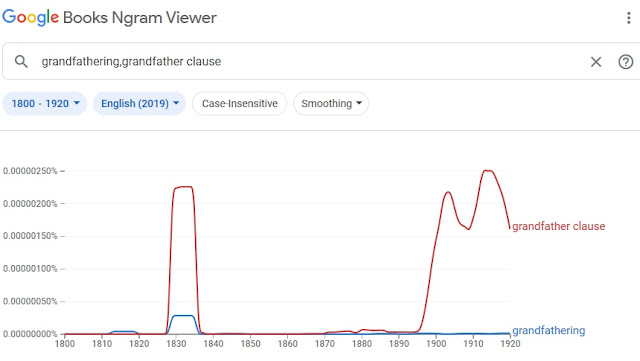 |
(1850s Know-Nothing Cartoon Depicting Irish and German Immigrants Affecting the Election) |
The court explains:
"We decline to use that term, however, because we acknowledge that it has racist origins. Specifically, the phrase "grandfather clause" originally referred to provisions adopted by some States after the Civil War in an effort to disenfranchise African-American voters by requiring voters to pass literacy tests or meet other significant qualifications, while exempting from such requirements those who were descendants of men who were eligible to vote prior to 1867."
Except, that is not actually correct, as NPR reported some years ago. The practice of "grandfathering" does not have its origins in anti-black sentiment in southern states. In fact, the term was used earlier, and in the north -- ironically, in Massachusetts -- against the surge of immigrants from Ireland, Germany, and Great Britain. Google's Ngram results also show pre-Civil War use:
Discrimination against Irish, German, and British immigrants would have been based in anti-immigrant sentiment, and possibly ethnic sentiment. But to say the practice "has racist origins," particularly against blacks in the post-Civil War south, is historically inaccurate.
The practice, of course, against whatever group, is inexcusable. But one hopes that we could learn to eschew bad government practices on their merits, and not on the basis of the race or class of their victims.But progress is progress, even if ahistorical, right? Sadly, no. U. Penn linguist Nicole R. Holliday (who, the NY Times deems relevant to note, is black), "said she would not correct her own mother if she used the term 'grandfathered' in casual conversation, because doing so would be 'actually rude, and it doesn’t accomplish the goal of creating a more equal society.'" Still, Prof. Holliday supports the decision. Replacing the term, she says, even if it won't accomplish anything, is "not too much to ask."
The good professor is on to something. Our fellow Americans need only ask, in earnest, and we should only be too happy to find an alternative to words that make them uncomfortable. It is the litigious approach that one finds grating -- the approach that begins by mining the record for evidence and arguments (even if faulty); the approach that pits victim groups against oppressor groups; the approach that assumes all the work of justice lies in establishing guilt.
Besides, were I to advocate for a client seeking the protection of a "grandfather" zoning clause, I would have misgivings about associating it with statutes long-held to be illegitimate. (Not to mention we all know how racist grandfathers tend to be.)
And yet: the Massachusetts court does not question the land use practice formerly known as "grandfathering." So governments may still allow nonconforming preexisting land uses. Just don't call it grandfathering.


1 comment:
Replacing the term, she says, even if it won't accomplish anything, is "not too much to ask."
Although I disagree strongly, I would not know how to argue to the contrary as this is not an argument.
For us to stop this illogical nonsense is not too much to ask either, but it all depends on who first occupies the high ground as to "what is too much to ask."
FTR, both my grandfathers died in poverty. Still, as immigrants to America, they considered it as having been a good life.
Post a Comment